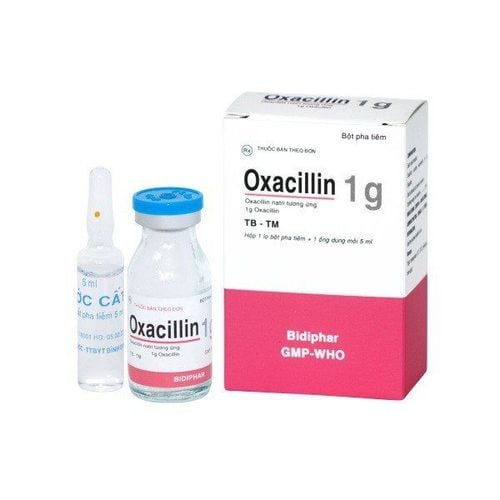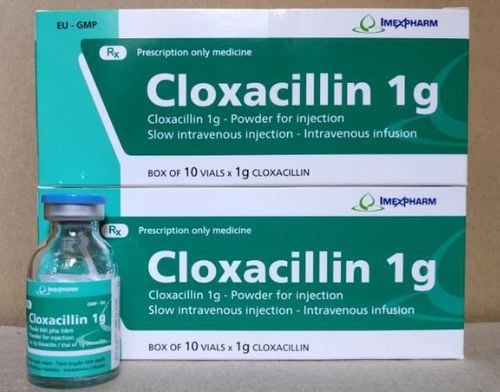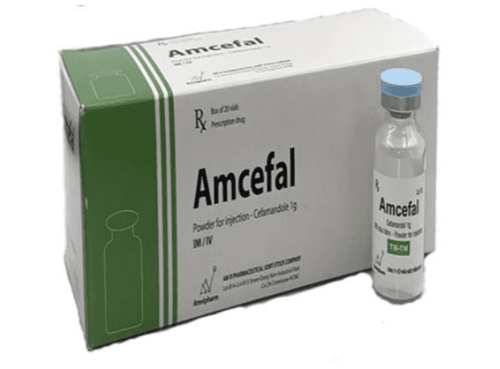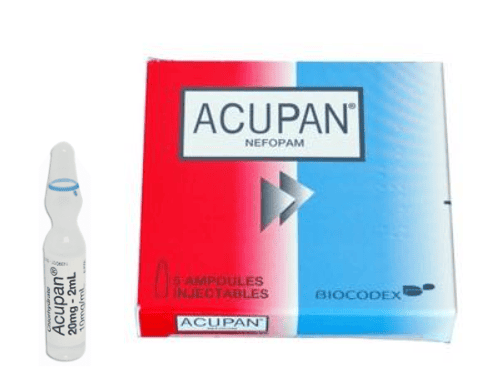This is an automatically translated article.
Voxin 500mg is an antibiotic containing the main active ingredient, Vancomycin Hydrochloride. Voxin 500mg is used intravenously in the treatment of infections such as endocarditis, staphylococcal infections, sepsis,...
1. Ingredients Voxin 500mg
Voxin 500mg is a lyophilized powder for injection containing the main active ingredient is Vancomycin Hydrochloride 500mg, corresponding to 500,000 IU Vancomycin.
2. Indications of Voxin 500mg
Voxin 500mg is used intravenously in the treatment of the following infections:
Severe infections caused by staphylococci sensitive to the drug and resistant to methicillin. Endocarditis Intravenous vancomycin alone or in combination with gentamycin is recommended for the prophylaxis of infective endocarditis in patients with penicillin allergy, congenital heart disease, rheumatic disease, or acquired valvular heart disease. other. Other infections: staphylococcal infections, including bacteremia, osteomyelitis, lower respiratory tract infections, skin and soft tissue infections.
3. How to use Voxin 500mg
3.1 Voxin dose 500mg People with normal kidney function:
Adults: Intravenous dose 2g/day divided into 500mg small doses, used 6 hours apart. Children: The usual intravenous dose is 10 mg/kg given 6 hours apart. Each dose should be given over at least 60 minutes. Neonates: In neonates, the initial dose is 15 mg/kg, followed by 10 mg/kg every 12 hours for the first week postpartum and every 8 hours until 1 month of age. Patients with impaired renal function and elderly patients: Adjust dose in patients with renal impairment. In premature infants and the elderly, a dose reduction may be necessary because renal function is often poor in these subjects. 3.2 How to use Voxin 500mg medicine Dilute 1 vial of Voxin 500mg in 10ml of diluent. Voxin is used for intravenous injection.
4. Contraindications of Voxin
Voxin is contraindicated in patients with known hypersensitivity to vancomycin or to any of its components.
5. Side effects of Voxin
Some undesirable effects may be encountered during treatment with Voxin 500mg: symptoms of pseudomembranous colitis may occur during or after treatment, ototoxicity, reversible leukopenia.
6. Voxin drug interactions
Some drug interactions may occur when Voxin 500mg is used concurrently with anesthetics, nephrotoxic drugs or with hearing such as Amphotericin B, Aminoglycoside, Bacitracin, Cisplatin, Dexamethasone...
7. Be careful when using Voxin
Rapid bolus injections (within minutes) can cause hypotension and cardiac arrest. The drug should be diluted and infused over a period of not less than 60 minutes to avoid rapid infusion reactions. The immediate response to these reactions is to discontinue the infusion.
Patients with overdose or latent deafness or concomitant use of ototoxic agents (e.g. aminoglycosides): There have been reports of ototoxicity with Voxin administration. In patients with renal insufficiency, because of prolonged and high blood levels of the drug, a dose adjustment should be considered in these patients. To reduce the risk of nephrotoxicity, continuous monitoring of renal function and attention should be paid to the dosage schedule for patients with renal impairment. Beware of the risk of pseudomembranous colitis when treated with broad-spectrum antibiotics (including macrolides, cephalosporins, and semisynthetic penicillins). Should be considered in patients with diarrhea following antibiotic administration. The severity can range from mild to life-threatening. Mild cases only need to stop taking the drug, moderate and severe cases need to apply appropriate treatment measures. Considering the overgrowth of antibiotic-resistant bacteria, the patient should be monitored closely. Reversible neutropenia has been reported in patients receiving vancomycin hydrochloride. WBC counts should be regularly checked in patients on prolonged Voxin therapy. Note that infusion-related adverse events (including hypotension, hot flushes, erythema, urticaria and pruritus) are increased when co-administered with anesthetics. Infusion-related undesirable effects can be minimized by infusion of vancomycin 60 minutes prior to anesthesia. Children: In premature infants and neonates, the desired serum vancomycin concentration should be determined. Pregnancy: It is not known whether the drug causes fetal harm when used during pregnancy or affects fertility. Use medication only when absolutely necessary. Lactation: It is not known whether the drug passes into breast milk. Caution should be exercised when using Voxin on this subject. Because of possible adverse effects in the nursing infant, a decision should be made whether to discontinue nursing or discontinue the drug. The above are the important uses of Voxin medicine. Knowing the information, dosage, and how to store it will help the drug in treatment be more effective.
Please dial HOTLINE for more information or register for an appointment HERE. Download MyVinmec app to make appointments faster and to manage your bookings easily.













